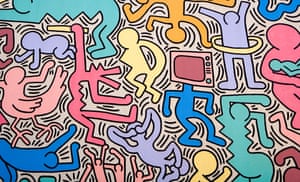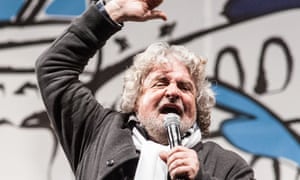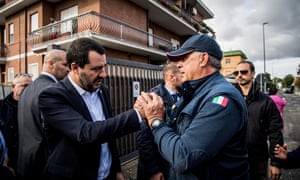'Italians first': how the populist right became Italy's dominant force
The small Tuscan town of Cascina has never enjoyed the glamorous status of world-famous neighbours such as Siena or San Gimignano. But in its heyday it made some of the finest household furniture in Italy. For generations of newlyweds looking to furnish their new homes, a visit to Cascina was a rite of passage.
Hard-working and close-knit, the town’s politics were firmly to the left. In a small patch of green near the handsome 16th-century clocktower, Communist mayors erected monuments to those who died fighting Mussolini and the Nazis. After the fall of the Berlin wall, the Italian Communist party gradually morphed into the centre-left Democrats, but the Cascinese, by and large, stayed loyal.
But over the past 20 years, most workshops have closed their doors. Some were unable to compete with the likes of Ikea; others were finished off by the 2008 crash. The great exhibition hall, where the town’s finely crafted wardrobes, sideboards and chairs were laid out for prospective buyers to inspect, became a supermarket. Then, from 2011, a new challenge emerged as refugees who had made the crossing from Libya to Italy’s southern coast began to arrive.
Two years ago, Cascina suddenly turned its back on seven decades of tradition and voted for a very different kind of politician. Susanna Ceccardi, the town’s 31-year-old mayor, is a rising star of the rightwing League party. For years an also-ran of Italian politics, the League is about to chalk up six months in coalition government following elections that routed traditional centre-ground parties and handed populists a landmark victory.
Matteo Salvini, the deputy prime minister and leader of the League, has just made Ceccardi one of his chief advisers on security. Charismatic, confrontational and usually dressed in a leather jacket and jeans, Ceccardi is also the new party boss in Tuscany, where a Trumpian “Italians first” message is conquering great swathes of political territory. Pisa, Massa and Siena – traditional bastions of the left – all fell to centre-right and League candidates in local elections in the summer. Florence is the next target.
According to Ceccardi, it is the League that now speaks to Italy’s anxieties and insecurities. A combination of economic stagnation, austerity and a migration crisis has swept old political certainties and affiliations away.
“My grandparents were all communists,” she says, sitting in her mayoral office. “But I was born in 1987,” she says. “Two years later the Berlin Wall fell. So I feel no connection with those ideological battles between communism and fascism. During the election campaign here in Cascina, the left’s big theme was anti-fascism. They talked constantly about it – and they chose the wrong target because the League is not fascist. We talked to the people about real issues. The theme of dealing with mass immigration has nothing to do with fascism or anti-fascism. It’s about a problem people are experiencing in their everyday lives.”
About 600,000 refugees and migrants have entered Italy since 2014. In Cascina, a town of 45,000, a few hundred who made it across the Mediterranean attempt to eke out a living, waiting in vain for something to turn up. Ceccardi has cancelled a government-funded project to integrate migrants by helping them with accommodation and work opportunities. “Those resources are needed for Cascina people,” she says. “Cascinesi first.”
Non-Italians who request social housing are required to provide documentary evidence from their home country, proving they own no property there. For most, the likelihood of gaining access to such documents is close to zero. “People elected me to make sure Italians are first on the list for housing,” says Ceccardi.
Twice a week an army Land Rover tours the town as part of the mayor’s new law and order strategy (one of Ceccardi’s nicknames is Lady Security). More police have been hired, with €30,000 (£26,000) spent on new uniforms. Free pepper spray canisters have been made available to women on request. “You only need to look at the prison population,” says Ceccardi, “to see the link between mass immigration and insecurity.” A local “welcome centre” for migrants, notorious for the squalor of its conditions, has been closed.
Ceccardi has waged a series of small culture wars with the local left, relentlessly attacking “buonisti” (do-gooders) – a favourite League target. Before becoming mayor she campaigned against a project to teach Cascina’s children the lyrics to John Lennon’s Imagine, a song she views as communist propaganda. Installed at the town hall, she has pressured schools to abandon the singing of traditional anthems of the Italian resistance such as Bella Ciao. “These songs are not really resistance songs any more,” she says.
A local priest, Don Elvis, was condemned by a League councillor, now an MP, for providing free breakfasts for asylum seekers before mass on Sundays. The arts have also been targeted. Cascina’s theatre once specialised in experimental productions, often with a social message, but the actor and League supporter Andrea Buscemi became its president in August 2016 and changed the programme to standard Italian and European classics.
Buscemi recently became embroiled in a row over the artistic merit of Pisa’s famous Tuttomondo mural, painted in 1989 on the wall of a church by the American artist Keith Haring. A colourful portrait of global solidarity – its name means “all the world” – the mural depicts different races reaching out to each other. In a polemic titled I Want Pisa Back, Buscemi condemns the mural as “utterly banal”. He also writes of “a strange suicidal tendency pushing Europe (and Italy) not only to open up its doors to whoever it might be, but also to forget to safeguard its own culture … In the ‘melting pot’ that follows globalisation, I see a precise ideological design being realised: the taking away of particularities of place … turning us all into migrants, without a homeland or borders or language.”
These cultural skirmishes have their roots in a dark philosophy of history that senior League figures share with Marine Le Pen’s National Rally and Viktor Orbán’s Fidesz. “In the history of peoples,” says Ceccardi, “there isn’t one civilisation that didn’t have to defend itself. Think of the Mayans. Outsiders who were more powerful than they were arrived and defeated them. But in the past, beleaguered civilisations defended themselves. The only one which hasn’t is the western civilisation. Instead of defending ourselves, we say: ‘Come on in!’”
As the Ceccardi revolution has unfolded in his home town, Michelangelo Berti, a teacher and Democratic party activist, has looked on with growing dismay. “In no time at all,” he says, “values which were the foundation of a cross-party consensus for 70 years are being demolished. Ideas of solidarity, tolerance, minority rights and moral obligation to those in need, even if it costs you something, have gone. The boundaries have been redrawn.”
A perfect storm
Western Europe’s first anti-establishment government is a strange hybrid. The original Northern League was formed in the 1990s to defend the interests and prejudices of small businesses in Italy’s north. Its cause celebre was a quixotic crusade to free “Padania”, a notional northern territory stretching from Umbria to the South Tyrol, from the fiscal demands of “Roma ladrona” – “thieving Rome”.
Its coalition partner, the Five Star Movement (M5S), founded by the comedian Beppe Grillo in 2009 and led by Salvini’s fellow deputy prime minister, Luigi Di Maio, has attracted support from both the right and the left. Electorally it has thrived in the south and among the young and unemployed, whose economic prospects have flatlined for a generation. In government, these odd bedfellows have found a vocation combining anti-austerity economics with, at times, outright xenophobia.
“To understand what has happened in Italy this year,” says Gianfranco Baldini of the University of Bologna, “you have to go back to 2011. That’s when western governments decided to bring down [Muammar] Gaddafi. Libya was of course a dictatorship, but you had someone to deal with. It was inconceivable that Gaddafi would ever have allowed huge numbers of people to travel through Libya to cross to Italy as a means to get to Europe from Africa and the Middle East. So the immigration crisis began there.”
In the same year, Baldini says, the eurozone sovereign debt crisis that followed the 2008 crash was leading to ferocious speculation against Italian government bonds. Italy’s national debt was huge. But as the third-largest economy using the euro, it was too big to fail. Under pressure from Brussels and other European governments, the then prime minister, Silvio Berlusconi, resigned and the president, Giorgio Napolitano, a former communist, appointed an unelected “government of experts” headed by the former European commissioner Mario Monti. His brief was to raise taxes, slash public spending and reassure the financial markets. A recession and soaring youth unemployment was the inevitable result of what one critic described as Monti’s “austeritarian” approach.
The technocratic gamble – in effect a suspension of the normal democratic process – had far-reaching consequences. “Both the big parties on the centre left and centre right [Forza Italia and the Democratic party] willingly stepped aside,” says Baldini, “to allow Monti to form this unelected government. That meant that the only real opposition parties left were the Northern League and Five Star. Put together the need to cope with the huge rise in the numbers of migrants and the imposition of austerity in this way and you had a perfect storm in the making.”
The wildly unpopular Monti was succeeded by Matteo Renzi of the centre-left Democratic party in 2013. He promised to end austerity but did not, and failed to persuade the rest of Europe to properly share the burden of the migration crisis. When he called a constitutional referendum to consolidate his power and lost, the storm broke. The consequences, for Italy and Europe, are now playing themselves out.
A large majority of Italians back Rome in its confrontation with the EEU over a budget that, if enacted, could lead to the bloc’s fiscal rules being breached. In order to fulfil manifesto promises to lower the retirement age, introduce a flat tax and finance a new “citizen’s income” of €780 a month, the coalition has committed to a budget deficit of 2.4%. Brussels, alarmed at the size of Italy’s public debt and lack of growth, which will make paying it off ever harder, has flatly rejected the plan and threatened to impose financial sanctions.
Sabres have been rattled on both sides. This month, the EU’s economics chief, Pierre Moscovici, warned there could be no compromise. In echoes of 2011, the ratings agency Moody’s has downgraded the country’s debt to one rung above junk status.
But these are precisely the enemies that the new government wishes to make. Latest polls indicate that the coalition partners enjoy a combined 60% approval rating. Since entering the government as the junior partner in May, the League has virtually doubled its approval ratings to 36% and is Italy’s dominant force, eclipsing M5S.
Massimo Tamburri, a marketing consultant and M5S activist in the town of Ascoli Piceno in central Italy, says: “What we are attempting here is the most far-reaching experiment in the world. This is taking on the financialised capitalism that has held sway for so long. We’re being called stupid, crazy, and we’re being told to shut up. But we will see.
“When was the last time a government commanded this kind of approval? And it’s a government that is constantly under attack by the mainstream media.”
C’e solo un Capitano (there’s only one Captain)
In a short space of time Salvini has become the face of Italy’s experiment in taboo-busting politics. Nicknamed “the Captain” by his supporters, the AC Milan-supporting northerner is more experienced, streetwise and social media-savvy than his southern counterpart, Di Maio, and 58% of Italians believe he calls the shots. No one would say the same of the country’s nominal prime minister, the Florentine lawyer Giuseppe Conte.
Since May, Salvini has energetically pursued numerous high-profile confrontations abroad and at home. In June, using his powers as minister of the interior, he caused an international outcry by closing Italy’s ports to NGO-operated ships carrying migrants and refugees. In the same month he denounced the mayor of a Calabrian town who had actively welcomed migrants.
In July, Salvini filed a lawsuit for defamation against the author Roberto Saviano, one of the fiercest critics of his authoritarian style. Saviano responded to the announcement of legal action by accusing Salvini of being “afraid of critical voices”. The deputy prime minister also appeared to hinton national radio that the author’s police protection, granted following mafia death threats, might be removed.
When a security bill was introduced that proposed a 9pm curfew on “ethnic” shops, which Salvini claimed had become “meeting places for drunkards, pushers and hell-raisers”, opposition MPs compared the move to the politics of 1930s Germany. Last month a League mayor in the northern town of Lodi was accused of “apartheid” measures after refusing school meals to children of migrants who could not provide formal declarations of assets from their home countries. The policy, which Ceccardi advised on, was backed by Salvini before opposition from M5S forced a climbdown.
Other minorities have been targeted. Using a favourite turn of phrase, Salvini has threatened to “bulldoze” a Roma camp in Rome and pledged to conduct a census of the community in Italy as a whole. Last month he threatened to “return with the bulldozer” to San Lorenzo, a leftwing quarter of the capital, following the murder of a 16-year-old girl.
“In Rome, as elsewhere in Italy,” said Salvini, “we will have an emergency programme of evictions. We will hurt the drug dealers. We will make sure the rules are respected.” The violence of the language echoed a notorious election campaign speech in which the League leader said Italy needed a “mass cleansing, street by street, district by district”.
Saviano has accused Salvini of “attempting to turn a democracy into an authoritarian state”, while Berlusconi said the new government had created an “illiberal” mood “which is the antechamber to dictatorship”. Salvini’s response to the former prime minister was characteristically rebarbative: “The only ones who think that are him, a few Brussels bureaucrats and some frustrated Democrats. Whoever talks about the risk of dictatorship in Italy, whether it’s Jean-Claude Juncker [president of the European Commission], Saviano … or Berlusconi are wrong. Completely wrong.”
The League’s rapid expansion on to the national stage – in 2013 elections, as the Northern League, it scored just 4% – has led to a hasty recruitment drive. It has allowed the far right to expand its influence in the party with little scrutiny. Lynda DiMatteo, a political scientist based in Paris, cites an incident this year in the town of Macerata, when Luca Traini, a failed Northern League candidate at local elections, shot six black passersby from a car following the murder of a woman. Neo-nazi material was later seized from Traini’s home.
No one died in the attack and Traini apologised in court for his actions, saying: “While in prison, I have understood that the colour of one’s skin has nothing to do with anything.”
But Salvini blamed the shootings on “out-of-control immigration … which leads to social conflict”. That response led the then head of the Italian parliament, Laura Boldrini, to comment: “What happened at Macerata shows that to incite hatred and legitimise fascism, as Salvini does, has real consequences.”
As the most powerful figure in the government, says DiMatteo, Salvini is in a position to perfect the role of strongman. “He is presenting himself as the father of all Italians, infantilising them in the process. And he is legitimising and fuelling their anger to a dangerous degree.”
Italy was the proud host of the Treaty of Rome in 1957, which created the European Economic Community. Until only a few years ago it remained one of the most europhile countries in the EU. But the nationalist genie is out of the bottle.
With alarming speed, Italy appears to be transitioning from the ‘austeritarian’ past embodied by Monti to an authoritarian present presided over by Salvini. “Wherever this goes,” says Baldini, “the technocratic option of 2011 is not available now, given the election result. Italy is hitched to this rollercoaster for better or for worse.”
source:.theguardian.com








.jpeg
)






கருத்துகள் இல்லை